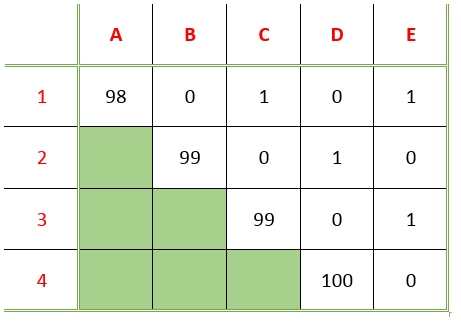Gather your friends and Practice it
 Five pirates have obtained 100 gold coins and have to divide up the loot. The pirates are all extremely intelligent, treacherous and selfish (especially the captain).
Five pirates have obtained 100 gold coins and have to divide up the loot. The pirates are all extremely intelligent, treacherous and selfish (especially the captain).
The captain always proposes a distribution of the loot. All pirates vote on the proposal, and if half the crew or more go agree with him, the loot is divided as proposed, as no pirate would be willing to take on the captain without superior force on their side.
If the captain fails to obtain support of at least half his crew (which includes himself), he faces a mutiny, and all pirates will turn against him and make him walk the plank. The pirates start over again with the next senior pirate as captain.
What is the maximum number of coins the captain can keep without risking his life?
The answer is 98.000.
This section requires Javascript.
You are seeing this because something didn't load right. We suggest you, (a) try
refreshing the page, (b) enabling javascript if it is disabled on your browser and,
finally, (c)
loading the
non-javascript version of this page
. We're sorry about the hassle.

Assumptions :
The captain is the pirate 5, the senior most of all the second senior most being pirate 4, the third senior most being pirate 3, the fourth senior most being pirate 2 and the most junior being pirate 1.
The captain says he will take 9 8 coins, and will give one coin to the third most senior pirate and another coin to the most junior pirate. He then explains his decision in a manner like this :
CASE 1: If there were only 2 pirates left. Pirate 2 being the most senior, he would just vote for himself and that would be 5 0 % of the vote,and pirate 1 would get nothing. and pirate 2 is obviously going to keep all the money for himself.
CASE 2: If there were only 3 pirates left . Pirate 3 has to convince at least one other person to join in his plan. Pirate 3 would take 9 9 gold coins and give 1 coin to pirate 1. Pirate 1 knows if he does not vote for pirate 3, then he gets nothing (since if he doesn't join the plan, Pirate 3 is killed & CASE 1 comes in action where he doesn't get anything.) So obviously pirate 1 is going to vote for this plan.
CASE 3: If there were 4 pirates left . Pirate 4 would give 1 coin to pirate 2, and pirate 2 knows if he does not vote for pirate 4, then he gets nothing (since if he doesn't join the plan Pirate 4 is killed & CASE 2 comes in action where he doesn't get anything). So obviously he is going to vote for this plan.
Finally now there are 5 pirates , so the captain would give one coin each to pirate 1 and pirate 3 since they know that if they don't vote for pirate 5,then they will get nothing (as Pirate 5 will be killed and CASE 3 will come in action). So obviously they are going to vote for this plan.
So, the captain can get maximum of 9 8 c o i n s .